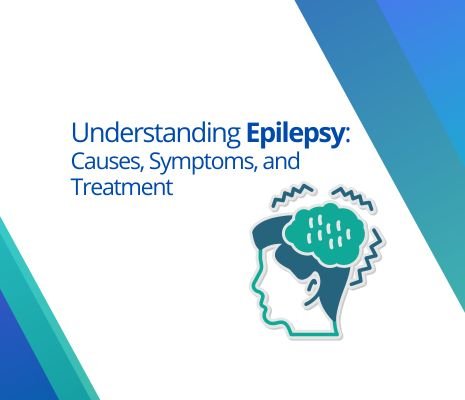Understanding Epilepsy: Causes, Symptoms, and Treatment Options
Epilepsy is one of the most common neurological disorders, affecting millions of people worldwide. It is characterized by recurrent, unprovoked seizures—sudden bursts of abnormal electrical activity in the brain that can affect awareness, movement, sensation, or behavior.
While epilepsy can sound intimidating, the good news is that most patients can lead completely normal lives with the right diagnosis and treatment
What Causes Epilepsy?
Epilepsy can occur due to various reasons, including:
- Brain injury or trauma – such as after an accident or fall
- Stroke or brain infections – including meningitis or encephalitis
- Developmental abnormalities in the brain
- Genetic factors – some forms of epilepsy run in families
- Brain tumors or structural lesions
Recognizing the Symptoms
Seizures can look different in different people. Some may experience full-body jerking movements (known as generalized seizures), while others may have brief moments of staring, confusion, or loss of awareness (partial seizures).
Common symptoms include:
- Sudden jerking or twitching of limbs
- Loss of consciousness or awareness
- Repetitive movements or unusual behavior
- Sudden confusion or unresponsiveness
- Strange sensations, smells, or visual disturbances before a seizure (aura)
If you or someone around you experiences these symptoms repeatedly, it’s important to consult a neurologist or neurosurgeon for proper evaluation.
Diagnosis of Epilepsy
Diagnosis involves:
- Detailed medical history and symptom review
- EEG (Electroencephalogram): to record electrical activity of the brain
- MRI Brain: to detect any structural abnormalities or lesions
- Blood tests to rule out metabolic or infectious causes
These tests help determine the type and cause of epilepsy, which is crucial for selecting the right treatment plan.
Treatment Options
Epilepsy treatment aims to control seizures, minimize side effects, and improve quality of life.
- Medication:
Most patients achieve good control with anti-epileptic drugs (AEDs). It may take time to find the right medicine and dose. - Surgery:
For patients whose seizures do not respond to medication, epilepsy surgery can be an option. The procedure involves removing or isolating the area of the brain responsible for triggering seizures. - Vagus Nerve Stimulation (VNS):
A device implanted under the skin sends mild electrical impulses to the brain, helping to reduce seizure frequency. - Lifestyle Modifications:
Adequate sleep, stress management, avoiding alcohol, and maintaining medication compliance are key to preventing seizure triggers.
Living with Epilepsy
With timely diagnosis and proper care, most people with epilepsy live healthy, independent lives. Regular follow-up with your doctor and staying consistent with medication can drastically reduce the frequency and severity of seizures.
If you notice uncontrolled seizures despite treatment, or if a seizure lasts more than 5 minutes, seek emergency medical help immediately.
Expert Care for Epilepsy in Pune
Consulting Dr. Vishal Bhasme, patients receive comprehensive evaluation and individualized treatment for epilepsy and other neurological disorders. Dr. Bhasme specializes in neurosurgical management of brain and spine conditions.















